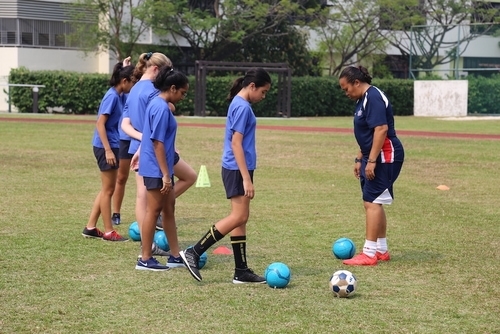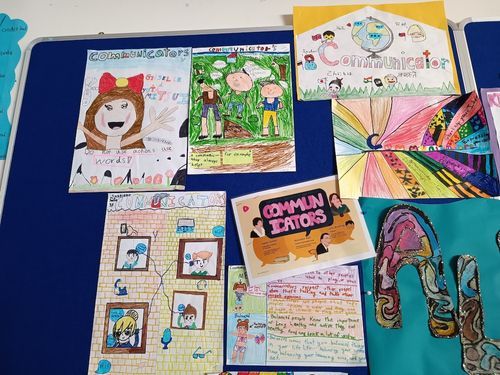We live in challenging times. Climate change is negatively affecting agriculture and food production. Communities are increasingly concerned about how they can conserve natural resources while sustaining growing populations. People are realising that this planet only has finite resources and at the speed that they are being used they will be gone before we know it.
Fluctuations in the economy, inequitable distribution of resources and an unpredictable job market are making it nearly impossible for disadvantaged people to climb out of poverty. With the recent pandemic the world as we knew it has changed enormously. This pandemic has had global impact, and has shown that protecting the planet is crucial. Now more than ever, students need more than textbook knowledge to conquer today’s complex problems. They need to be strong leaders with a range of skills in all areas, who are adaptable and driven to make a change. At OWIS, that’s where creativity, activity, and service (CAS) comes in.

Students need a way to bridge the classroom and the community. Otherwise, they spend time studying theories they cannot apply and then engage in real-world practices that do not correlate with the fundamentals taught at school. They can lose interest in their education quickly and become distracted in the classroom. Education needs to be relevant to the modern world and cover subjects that relate to how we live today.
What is CAS?
CAS (creativity, activity and service) makes up a large part of the International Baccalaureate Diploma Programme (IBDP). Using CAS, we at OWIS aim to help our students mature into well-rounded and balanced young adults. We teach them more than just academic skills and ensure that they are able to integrate into a range of situations.
The CAS programme begins at the start of the IB DP course in Grade 11 and continues for a total of 18 months. CAS is all about our students obtaining new skills, interests and talents or further developing their existing skills, interests and talents. Students are able to take ownership of their development and learn to work with each other to improve other peoples’ lives.
Seminars help prepare students for CAS, and there will also be opportunities for parents to learn about the programme along with the training sessions for teachers. We encourage parents to get involved with the programme and to support their children, whether that be by dropping them to events, providing them with ideas and support or attending the events that they organise.
At its heart, CAS takes students on a personal journey toward being the best they can be. It makes them caring and empathetic individuals with a passion for helping others. They learn to appreciate their own fortune and that they can make a difference to others’ lives through small yet meaningful acts of kindness.
.png)
How CAS Works: The Relevance of Creativity, Activity and Service for Students
Although the IB DP course is academic in nature, it also provides opportunities for students to serve as leaders in their schools and communities as well as to explore their creative and active nature. It gives students a holistic education and provides them with the opportunity to learn through a range of different techniques. In fact, CAS underpins the entire IB DP course by giving opportunities to be an active and physical learner. It also ensures that all students are given equal opportunities, as those who may find classroom-based learning more difficult may excel in other areas.
CAS is composed of three distinct elements, and these are explained below:
- Creativity: Creativity is imperative in an ever-changing society. The challenges our society faces aren’t the same as those we’ve encountered in the past, traditional solutions won’t go far enough to address them. Our world needs innovators and people who will continue asking questions and want to better the world around us. We need people who can be creative when problems present and think outside the box. Creativity encourages students to come up with unique ways to solve problems.
CAS also equips children with the skills to consider their ideas from different angles and test them in the real world. It teaches them that there isn’t just one answer and it helps them understand that usually the first idea to sort out a problem will not be the last.
At OWIS, we encourage our students to apply their creativity in a variety of areas – not just social change – so that “outside-the-box” thinking becomes second nature to them. Students may, for instance, take up a new musical instrument or a student who is an excellent player in one instrument could learn to play a familiar piece of music in another instrument. A theatre novice with some amount of practice could make their on-stage debut in an after-school drama class. These are all skills that are so important throughout life and show that our students are adaptable and always striving to better themselves.
- Activity: The activity component of our CAS programme encourages students to be involved in individual and team sports, setting the stage for lifelong physical activity. In our highly digital world, people – children and teens included – are spending more time than ever engaged with smartphones and tablets. Sedentary lifestyles are contributing to health concerns not seen in previous generations, such as neck and back problems.
Learning new sports (or improving their skills in a sport they’re already familiar with) enables students to enjoy the benefits of a healthier lifestyle. These include higher energy levels, better academic outcomes and less risk of obesity and certain chronic illnesses. It also allows them the chance to take a break from their usual academic studies and expel energy. It helps to improve their teamwork, communication and technical skills. Often students may feel that they are out of their depth, for instance when they start a new sport, but this teaches them to be resilient and learn by doing. It also promotes the feel good feeling that sport gives to us all due to the release of endorphins. Projects could include learning rock climbing, taking up fencing or coaching a youth football team.

- Service: At OWIS, our students come from a variety of backgrounds, and service projects provide a means for them to find common ground whilst meeting authentic needs in the community and around the world. Many of our students have consistently enjoyed the privileges of adequate food, housing and quality international education. They may never have had much exposure to the economic and other obstacles that less-privileged people face.
For these students, serving disadvantaged groups and communities gives them valuable insight into how many people around the world actually live, and what they can do to make a difference. It nurtures their caring side and teaches them to treat everyone equally. It also shows them that there are so many walks of life, many of which follow hardship and do not serve up the same opportunities that they may have had. It teaches them to demonstrate compassion to all.
Some of our students, on the other hand, have already witnessed how adversity can devastate communities. They may have experienced it first hand, had family or friends in these situations, or lived in an area that has gone through adversity. For these students, service projects help them to see that people caught in cycles of hardship and poverty haven’t been forgotten. It also allows them to be first in line to help those who are going through difficult times, share their experiences with them and see the world from different perspectives. Our students can be the change agent that helps underprivileged individuals and families improve their quality of life and find hope for the future.
In service projects, students work together to engage with their communities in response to an authentic need. They learn to care for others and to put other people’s needs first. They are able to research different community initiatives and take part in them. In this area, students could organise a recycling initiative or host a games night for a senior citizens’ centre. This may be something that they do as a one-off event, or it may become a regular occurrence as part of their service project for the IB DP.
For example, in March 2021, Grade 11 students actively took part in the Think Kindness challenge, where we as a school had to try and record over 5000 acts of kindness in a 15 day period. They shared their views and thoughts on being kind within and around the school community. They actively performed random acts of kindness to contribute to the grand total as well.
Another example in a year when external trips were restricted due to Covid-19 is a Service project on Health and Safety at School. Our Grade 11 students made a video on this, and on April 16, 2021, they further discussed safety issues at school and their solutions in an assembly.

At OWIS, we are particularly excited about the service component, which provides an opportunity for students to contribute to an ever-changing world in a meaningful and helpful way. Students can raise awareness about issues, fundraise for charities or work alongside communities to support the needs identified when planning the service projecton a local, national or even international scale. From our school’s perspective, it opens our students’ eyes to the hardship that others may face and shows them how they can work as a team to make a difference in peoples’ lives who are less fortunate than themselves.
At OWIS, CAS is the backbone of our IB Diploma Programme. It supports the academic aspect of their study and gives our students key skills that they will take with them throughout their lives. We believe that, as a key part of our rigorous framework, CAS sets students on track to become the best global citizens and leaders they can be. To learn more about how CAS empowers our students, contact us to book a tour. We look forward to meeting with you.
(This blog was originally written in collaboration with Ms Luna Deller, former Deputy Head of School, OWIS Nanyang.)














